#coding villains and bad characters as queer
Explore tagged Tumblr posts
Text
"X is so genderidentity-coded" this "Z is b-sexuality and i will fight people on this" that, "10001 reasons why character C is [insert sexuality, gender identity, disability etc.]" shmat.
can we just go back to saying "I headcanon this character as being X, Y, Z"
If I see one more person use "[insert disability, gender identity, sexuality]-coded" in context of
"I personally view them as [sexuality] and a representation of [sexuality] and it's a positive thing and I will be upset if someone disagrees"
My brain will melt.
No one will fight you over headcanons, but some people will fight you over saying that a canonically pansexual character is 'actually lesbian/asexual/gay etc.'
#i feel like fandom etiquette is lost to time and fandoms and social media only suffers from it#bcs yes!! HC that this character is autistic or aroace or trans#everyone has headcanons!#but YOUR personal interpretation and takeaway of piece of media is NOT automatically canon#i remember writing an academic paper on queer-coding in american media and let me tell u none of it was positive#it started as filmmakers trying to pass the censorship by only coding characters as queer but it turned into just#coding villains and bad characters as queer#which harms the entire queer community#it applies to disabilities too#going 'oh they are so OCD-coded!' when a character just likes organizing and cleaning is not good#seeing a stereotype or crumb of stereotype and taking it as 'oh they are this then' is not great#ramble#qbr rambling
9 notes
·
View notes
Note
Did you have any foreknowledge that Anakin would become Darth Vader? I feel like even if you had Revenge of the Sith must have been quite an experience
Lmao I didn't know that until I came across this gif here in tumblr:
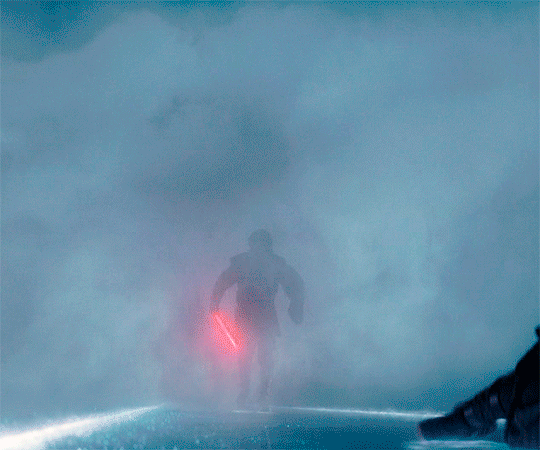
'oh damn'
That said, because of that gif, I did know he was going to be one of the most iconic and recognizeable villains of cinema by the time I started to watch the movies. But, my knowledge of what would happen was very, very narrow, I was very in the dark about it lol
Is easier to point out the things that I knew when starting the movies than the ones I didn't:
-He would lose his limbs (I did not know how, I didn't know he literally burned. And I only knew that he loses his limbs because my partner )
-He kills kids (and that I knew just because a meme that my hubby had to explain to me, but I didn't know the circumstances. In fact, what I pictured was much worse LOL)
-He kills(? Padmé (I asked my hubby if he and Padmé divorced, and he just decided to throw that spoiler at me like "no, he kills her accidentally" without further context and I was like...oh woah okay...I...generally don't like villains that kill their wives but i'll still check that out)
-Samuel L. Jackson is in these movies! :D
-HE IS LUKE'S FATHER OMG OMG AND IS TWINS OMG LEIA?? ...Wait don't Leia and Luke kiss- Oh okay
And sufficient to say: ROTS still destroyed me emotionally, what a trip. But I had a blast watching these movies, and it was also a blast watching the Original Trilogy after that! I was so, so stunned about the end of ROTJ, because seriously I always thought Luke kills Vader even when my interest on SW was below zero.
And no, I still don't know how at 24 i managed to know so little about Star Wars SJNKJNSDF
What I thought would happen in these movies was that my guy here was going to be just this cool merciless villain from about the get-go and we would just met him as an adult already. Like, he would be this dark jedi working by himself ruining the order from the inside, going into murders on weekends and blame someone else for fun, the war would be his doing, and being creepy towards everyone included his wife was probably his hobby, idk, you get it, your basic 'cool lonely villain', like maybe a Sauron of sorts.
And then George Lucas tackled me with... this
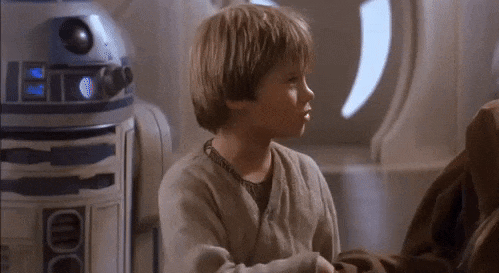
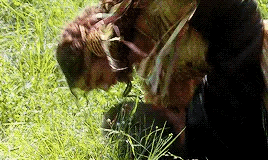
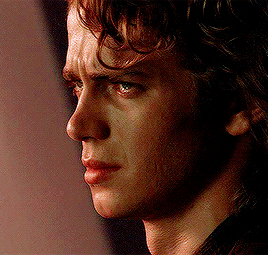
Hey, I'm not complaining.
My hiperfixation on Anakin and Star Wars helped me a lot with my depression, truth be told!
#thanks for the ask!#ask#star wars#sw#anakin skywalker#rambling#silly posting#i am so so so so so so grateful that instead of an edgy cool villain i ended with a character so deeply traumatized and troubled#that i can relate he's also very neurodivergent and queer coded to me in a way which also makes him even more relatable to me aha!#i don't go into murderous reality breakdowns but the awful levels of stress and a bad unbringing and not sleeping at all hey i get it boy#sw rots#revenge of the sith#prequel trilogy#original trilogy
110 notes
·
View notes
Text
As this year comes to a close here's hoping for more (I.e. any) Morally grey aroace protagonists in (adult) fiction. Because as much I love Ymir by Rich Larson, I can't just keep reading one book over and over again. I'm starving for Dirtbag Aces in media.
#books#asexual#booklr#ace#asexual books#aroace#ace books#I honestly feel so alone in wanting more villainous or at least not 100% squeaky clean moral paragon ace characters#especially bc the rest of the community has decided that those type of aces are “bad representation” like yeah there's a history of villains#being coded as asexual to emphasise their evil bc appearantly not experiencing attraction = evil#but God damn it is so demoralising seeing other queer identies getting to have Good(!) messy/morally derelict representation that has#dedicated subcultures that clamour for and celebrate such#but the ace community is still on that infantilisation type beat where ace characters have to be the most blandly inoffensive#can't so much as say a mean word goody toe shoes or it's “bad rep”#pheww I went off a bit there but uh yeah if you want a class traitor drug addicted cyborg alien monster hunter ace mc then read#ymir by Rich larson#and if you also appreciate a good villainous ace then let me know so I'm not the lone ace who likes the “bad rep” aces#also i don't dislike good/nice characters and I genuinely hate the edgelord sentiment that good/nice (queer) characters are boring ugh#I'd just like to see more variety in aroace characters and not see every halfway decently written villainous ace character get dumped on for#“bad representation” by the ace community#so yeah I love me some#dirt bag aces
13 notes
·
View notes
Text
JK Rowling & the Color Pink
So I'm working on a thing about queer coding in the Harry Potter books... and first I needed to do a sidebar on how the color pink is used. I’ve made a list of every time a character either wears pink, or is heavily associated with a pink object. We actually get some pretty clear categories that are unintentionally very revealing, and say a lot about how JKR sees "girly" femininity.
Let’s start off with the obvious:
PINK = VILLAIN (FEMME)
Petunia Dursley: “salmon-pink cocktail dress," "neat salmon-colored coat." Also paints her walls "a sickly peach color."
Gilderoy Lockhart: “lurid pink robes to match the decorations”
Pansy Parkinson: “very frilly robes of pale pink”
Rita Skeeter: “long nails were painted shocking pink”
Aunt Muriel: “feathery pink hat gave her the look of a bad-tempered flamingo.”
(Aunt Muriel only shows up briefly at Bill and Fleur’s wedding, but then proceeds to insult pretty much every other character, and give Harry an existential crisis by spilling the tea on Dumbledore)
Dolores Umbridge: “a horrible pink Alice band that matched the fluffy pink cardigan.”
(Also: has pink stationary, and her pamphlet MUDBLOODS and the Dangers They Pose to a Peaceful Pure-Blood Society has a pink cover)
Cho Chang
(Okay. Not a villain per se, BUT. Cho is the reason the mole gets into the DA in the books (and just is the mole in the films.) And given that she is a sort of Umbridge-aligned sub villain in book 5, at least structurally... it IS interesting that the place she brings Harry for a date has this very pink, Umbridge-coded description.
It was a cramped, steamy little place where everything seemed to have been decorated with frills or bows. Harry was reminded unpleasantly of Umbridge’s office. “Cute, isn’t it?” said Cho happily. “Er . . . yeah,” said Harry untruthfully. “Look, she’s decorated it for Valentine’s Day!” said Cho, indicating a number of golden cherubs that were hovering over each of the small, circular tables, occasionally throwing pink confetti over the occupants.
Fleur Delacour: “[her wand] emitted a number of pink and gold sparks.”
(Also not quite a villain, and I adore Fleur BUT… she’s written hyper-femme in an intimidating, borderline threatening way. She’s very opinionated, bordering on rude. She’s “full of herself” as Ginny puts it. And when she gets engaged to Bill and becomes an unambiguously good guy, she has this interesting moment of ~Pink Rejection~)
“. . . Bill and I ’ave almost decided on only two bridesmaids, Ginny and Gabrielle will look very sweet togezzer. I am theenking of dressing zem in pale gold — pink would of course be ’orrible with Ginny’s ’air —”
Hermione Granger: “Wearing a pink bathrobe and a frown”
(Hermione wears pink exactly one time, and it is at her most villainous… during Book 1, when she tries to stop Harry and Ron leaving in the middle of the night to go duel Malfoy.)
A voice spoke from the chair nearest them, “I can’t believe you’re going to do this, Harry.” A lamp flickered on. It was Hermione Granger, wearing a pink bathrobe and a frown. “You!” said Ron furiously. “Go back to bed!” “I almost told your brother,” Hermione snapped, “Percy — he’s a prefect, he’d put a stop to this.” Harry couldn’t believe anyone could be so interfering.
(She literally does the sitting-in-the-dark, villain-lamp thing. Also, in case you were wondering, yes Hermione DOES get a moment of ~Pink Rejection~)
Near the window was an array of violently pink products around which a cluster of excited girls was giggling enthusiastically. Hermione and Ginny both hung back, looking wary.
Which brings us too:
PINK = SILLY/FRIVOLOUS (FEMME)
Sybill Trelawney: “after you’ve broken your first cup, would you be so kind as to select one of the blue-patterned ones? I’m rather attached to the pink.”
(She’s a fraud. Also hides empty bottles of sherry in the room of requirement. (I’m going to have to be uncharitable in this section, so am sorry.)
Parvati Patil: “robes of shocking pink"
(Often described as “giggling,” thinks Professor Trelawney is amazing, the real deal.)
The Fat Lady: “a very fat woman in a pink silk dress.”
(Often described as giggling. Drinks too much during the holidays. JRK is unfortunately well known for being fatphobic. Also the Fat Lady has a friend named Violet, and Parvati has a friend named Lavender. Not really going anywhere with that, just funny that they’re both shades of purple.)
Hepzibah Smith: “an immensely fat old lady wearing an elaborate ginger wig and a brilliant pink set of robes.”
(So… almost identical description to the Fat Lady. And I think we should maybe talk about her more, maybe? Because the way she’s framed… I think she might be Tom Riddle’s sugar mamma?)
“I brought you flowers,” he said quietly, producing a bunch of roses from nowhere. “You naughty boy, you shouldn’t have!” squealed old Hepzibah, though Harry noticed that she had an empty vase standing ready on the nearest little table. “You do spoil this old lady, Tom. . . .”
(Or maybe we… shouldn’t talk about that. Either way, Tom Riddle does kill her, steal her stuff, and frame her house elf so thats… not great.)
PINK = EMBARRASSING
“Everyone take a pair of earmuffs,” said Professor Sprout. There was a scramble as everyone tried to seize a pair that wasn’t pink and fluffy.
(Pink fluffy earmuffs are adorable.)
“Wash out your mouth,” said James coldly. “Scourgify!” Pink soap bubbles streamed from Snape’s mouth at once; the froth was covering his lips, making him gag.
(The next two example are 'pranks' as well, I think the pink-colored soap is there to add a kind of insult to injury.)
Shocking-pink Catherine wheels five feet in diameter were whizzing lethally through the air like so many flying saucers.
(This is a bit from Fred and George’s farewell firework show, it's funny that they’re specifically pink fireworks that Umbridge can’t get rid of.)
“Headless Hats!” shouted George, as Fred waved a pointed hat decorated with a fluffy pink feather at the watching students. “Two Galleons each — watch Fred, now!” Fred swept the hat onto his head, beaming. For a second he merely looked rather stupid, then both hat and head vanished.
(also just, pumping up an embarrassing moment)
PINK = OUTSIDER, WEIRDO
Hagrid
Hagrid’s flowered pink umbrella, which contains his broken wand, is brought up a lot. In this case I think we’re meant to see it as a joke. Hagrid’s so big, and so masc, but the pink umbrella makes him non-threatening. However… the pink umbrella, it’s not a totally positive thing, is it? It doesn’t match, it isn’t *him.* Hagrid wouldn't have chosen to carry this around, totally on his own, if he'd had any other choice. It sets him apart, both visually and socially (because it's a constant reminder that he doesn't have a wand.)
Dobby
Dobby, once he is freed, gets pink-and-orange striped socks, and they’re meant to communicate that he’s… kind of a lot. “Yeh get weirdos in every breed,” as Hagrid puts it. JKR has a very strange, honestly antagonistic relationship with Dobby. He’s the victim of book 2, but structurally kind of the villain? He describes the house-elves situation as “enslavement,” but Hermione’s treated as overdramatic for calling house-elves slaves two books later. And then everything is ret-conned and Dobby is… just kind of weird for liking freedom (and socks) as much as he does.
Tonks
Book!Tonks defaults to “bubblegum-pink” hair. Her hair is described as pink a lot. (Movie!Tonks defaults to purple hair, because they were worried that pink would visually align her with Umbridge.) And this is the oddest one on the list to me, because Tonks is such a universally beloved, fan favorite character. But I really do think that *as written*... we’re supposed to put her in a category with Dobby. The two of them leave (unintentional) destruction in their wake. They’re loud, they’re a lot, they take up too much space. Harry thinks they’re both kind of annoying. (and yeah, Harry 100% thinks Tonks is “a little annoying at times.”)
#jkr critical#anti jkr#hp#gender stuff#fashion history#nymphadora tonks#dobby#hepzibah smith#hermione granger#pink!#literary analysis#hp close reading
421 notes
·
View notes
Text
I think what I love about Vontra is that you immediately pick up that she's an antagonist.
Spoilery bits below, mostly I'm rambling.
We spent this whole movie with characters being introduced as threats, they attack Roz, break her, steal peices of her, insult her. Roz is subjected to the brutality of the food chain every scene of the movie, but for the animals this is natural, this is normal. You eat others, others eat you, you fight to stay alive every day.
Roz's compassion in encoded into her, it's the human pack bonding that makes everyone in the film think she's weird, and she never loses this most human part of herself. Proof that she was made by human hands, it saves her and everyone else.
Except that it's a part of human kind that humans in power don't like.
The place that made Roz wants everything to be perfect, it's a city of the future, an oasis for select humans to escape what is slowly revealed to be a world in ruins from climate change, but we never see more of that except the passing scenery of destroyed cities.
Life is still growing, still thriving, and corporations are still building walled cities and promising the ultra wealthy a completely subservient servant class.
When the ship arrives to collect Roz, the ship she's been trying to signal half the movie, we don't know what to expect. Are they friendly? Are they here to fix her? She's been slowly breaking down the final half of the movie, leaking fluid, losing peices, shutting down as her battery depletes faster and faster. She gets fatigued, she uses a prosthetic, she goes days without moving.
She is disabled.
And down from this ship that is supposed to rescue her drops a peppy sounding companion who promises to 'fix' her.
Even though she is programmed to sound happy to put others at ease, as she states, you know immediately that she is Bad News.
The way she talks down to Roz, her manner of speech, her constant invasion of personal space, her pointed questions that are obviously accusations.
Yeah we all went "ooh toxic yuri >3" because we love queer coded villains getting flirty.
But it was also very obviously meant to feel violating, specifically similar to medical violation.
Roz was on display as a disabled robot, something in need of repair, in need of help, but Vontra saw her as something needing to be Corrected, not simply fixed but full factory reset, all the bits of her that are unique sent away to be studied.
Roz wanted help, she wanted to belong, she wanted to be repaired, but she also still wanted to be HER. However it's her disability that influenced her changes in coding, she needed to create her own updates to get around issues she faced, and it created a personality she enjoyed being.
She wanted a choice, but Vontra was programmed to see all deviation from the norm as something in need of repair. Roz wasn't a person in need of help, she was a defect to be collected, studied, adjusted, and put back out into production.
Respecting Roz, her boundaries, her thought process, even her willingness to be touched, it didn't even occur to Vontra. Because Vontra is a robot programmed to collect broken robots, and Roz is a broken robot.
349 notes
·
View notes
Text
Crocodad Theory: The not-so-Crack-pot Theory.
Making this post in order to replace my old Crocodad thesis since I think I can do better now. Plus I was still using the old theory name then and I dislike seeing it pinned on my tumblr now. You can find that older post HERE if you desire to!
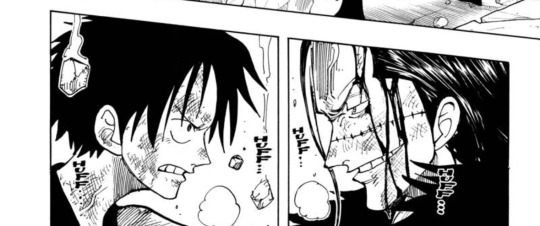
Crocodad theory, chances are you have heard about this theory if you are even slightly invested in the One Piece fandom. But despite its infamy, and outside its stanch believers like myself, it's mostly considered a crack theory and used for a laugh.
Now let's be clear, Crocodad theory is not a crack theory. A crack or crack-pot theory is more of a headcanon built on vibes, it's a fun idea made up out of thin air and isn't really serious. If the Crocodad theory was a crack theory it would have evaporated into the nether by now. It's over a decade old, after all, and yet it persists to this day! That is because the Crocodad theory has real evidence from the canon, the One Piece offshoots, and maybe even Oda himself.
If you weren't aware of the Crocodad theory, sometimes lovingly called Dadodile, let me summarize it very succinctly. The theory is that Crocodile is a transgender man and gave birth to Luffy. Crocodile is Luffy's other father and his birthing parent. If you think that sounds ridiculous or even hilarious, let me walk you through it because I assure you- that is intentional.
Let us begin where the theory began... Impel Down.
The possibility for this theory was born in 2009 with these panels:
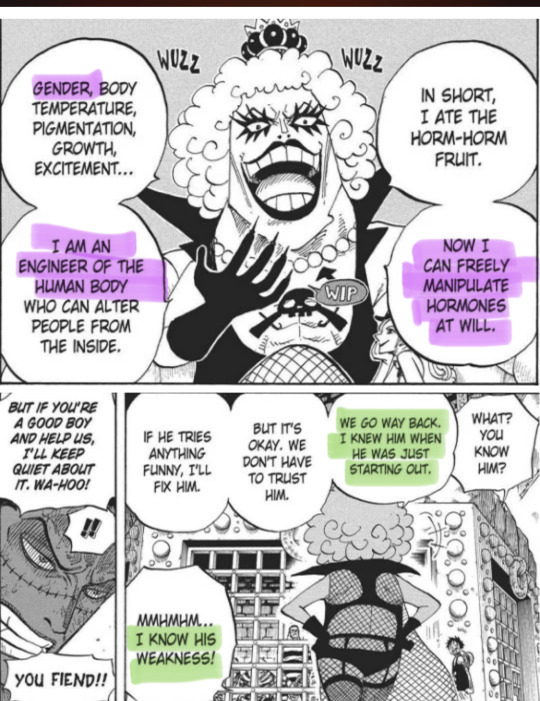
The simple fact that Ivankov exists and that he knows Crocodile, from "when he was just starting out" mind you, makes this not only possible but probable.
What other "secret" could Ivakov be speaking of here? It's definitely not his weakness to water, that would just be bad storytelling. It could be that Crocodile is the child of Rocks which is possible considering we now know Ivankov was at the Gods Valley incident. But if I could speak as a writer for a moment, it would really be a waste for an author to introduce a character that can change genders and then bring back one of the first big villains like Crocodile, AND THEN connect the two with the mention of weakness but not make that secret that Crocodile had once been a woman. Or even at least a part of the reason.
But if that reasoning falls through for you, here is some in-canon evidence for the idea that Crocodile is transgender:
First of all, the agents' code names are so gendered: Every single digit agent is Mr with a Mrs, or Ms partner.
Crocodile’s name. His moniker is different from almost every other powerful pirate the story introduces to us. He isn’t just Desert King Crocodile, he is Desert King Sir Crocodile. Again it is oddly pronoun-centered. As if he is trying to remind people that he’s a guy.
The introduction of Bon Clay. Bon Clay is our first canon queer character in One Piece. He makes mention of being a girl many times and feels like a joke character when we first meet him. But as we know in One Piece, a pirate crew is a reflection of the Captain. Crocodile isn’t prejudiced to queer people like Bon Clay alludes to others being a few times. Crocodile even allowed Bon Clay to be both the male and female of his team!
Next up was the reveal of Baby Crocodile and how it’s deliberating ambiguous what gender Crocodile is. In every other Warlord's childhood look reveal, their gender is obvious, so why was Crocodile left out of that?

Then of course we have Gold Roger's execution, and how almost everyone got a reaction panel. But not Crocodile. No, we only see the back of his head. Oda has shown that he loves to get every single character's reaction to major events, sometimes to a fault. So why is he trying so hard to hide Crocodile from us? It just isn’t Oda’s style to leave someone out unless there is some kind of secret he wants to build up too. Now be sure to keep this in mind for later.
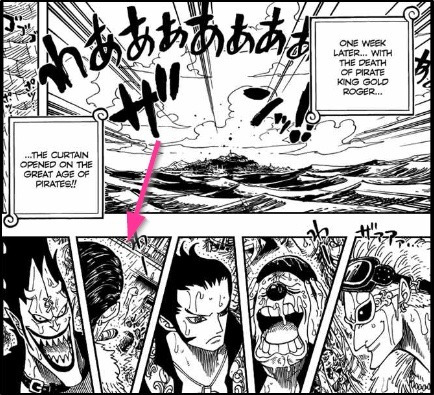
Last but certainly not least is just how much of an absolute troll Oda is. This will not be the last time I bring this up, Oda is a HUGE troll. He loves to play to his favorite fan theories and he decides most everything on how funny it is. And wouldn't it be funny if the first antagonist in the Grandline was secretly the birth parent of Luffy?
I mean just look at this! Oda, you absolute troll.
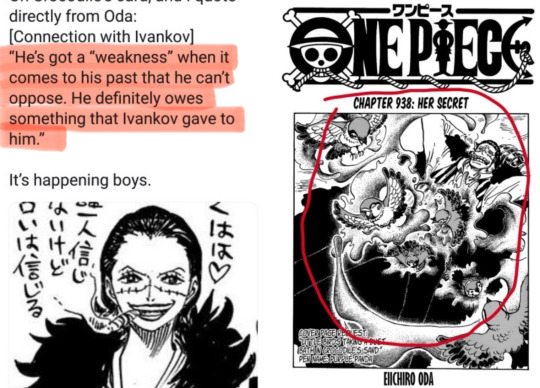
Bottom line: Trans Crocodile is more likely than not.
But this is where a lot of people decide the rest of this theory is crack, they take Trans!Crocodile and leave Crocodad out for reasons I honestly can't understand. Despite that, Cracodad has just as much if not more evidence than the Transgender part of this theory.
Before I begin I would like everyone reading to keep a few things in mind. All throughout the Impel down arc and the journey to Marineford, and even the first few chapters into Marineford, Crocodile could not have given a shit about Luffy, Ace, or the war at all. He did not care who won the war or if everyone involved died. He came to the battlefield for the sole purpose of killing Whitebeard. PERIOD. He was never once shown reacting with any concern when Luffy began facing down anyone strong. Not even Magellan. Crocodile had been around Luffy, seeing him do inspiring things for a massive amount of chapters by the time we get to Marineford, and yet Crocodile literally didn't care if Luffy lived or died, he just wanted to fight Whitebeard.
With that clear let's move on to what happened after Luffy's father was revealed to the world in Marineford. This moment is where the most obvious evidence first came about:
When Sengoku announces Luffy's father to the world we get many reaction shots, but once again Crocodile is conveniently missing from the lineup. He even disappears for a whole chapter! The young man who took down his decade-long plan to take over Alabasta just got announced to be the most wanted man in the world son, and we get no reaction from Crocodile... its suspicious.
Crocodile stopped Ace’s execution: Now Crocodile explains this by saying he ‘didn’t want to let Sengoku have the pleasure of victory’ but seriously? What kind of petty ass BS reasoning is that?! Crocodile has dreams and ambitions, and yet he gives up trying to be the one to take down Whitebeard to randomly save someone he canonly mocks in Impel Down? Someone he doesn’t care about. Some people will tell you it’s because Luffy inspired him like Luffy does many others, but what exactly is Luffy doing in Marineford that he didn’t in Impel Down or even Alabasta? Nothing. That means Crocodile has an entire about-face for no believable reason while completely off-screen. Which we've already said isn't Oda's style.
Daz and Crocodile face Mihawk to help Luffy: When Daz blocks Mihawk’s strike, Luffy questions it. Daz answers: It’s an order from above! That means Crocodile ordered Daz to specifically protect Luffy. Again, why? What reason did he have to do that? If this was some latent Crocodile has been inspired™️ moment, why wouldn’t Oda show it? Oda loves to hype up those moments, and loves to detail it all to the smallest piece. But Crocodile just randomly decided to have his main man Daz look out for this person that he COULDN’T HAVE GIVEN A CRAP ABOUT JUST TEN EPISODES BEFORE does not fit within the story. Then, right after Daz blocks Mihawk, Crocodile appears out of the woodwork to block another attack.

When Mihawk questions why he’d protect Luffy, Crocodile’s only response is “I’m not in the best mood now, Mihawk, you better watch yourself.” It’s interesting that he has no reason, none, he just comments that he’s in a shit mood. Maybe because he just found out he once stabbed his own child in the gut and left him to die?!
Crocodile vs Akainu: The brother killing Lava Man™️ is probably the most dangerous person in the war. He has no mercy, no morals, no restraint. So the fact that as Luffy is lying comatose and weak, with Jimbe slumped over him, Akainu about to deliver the final blow, Crocodile coming out of nowhere once again is so telling.
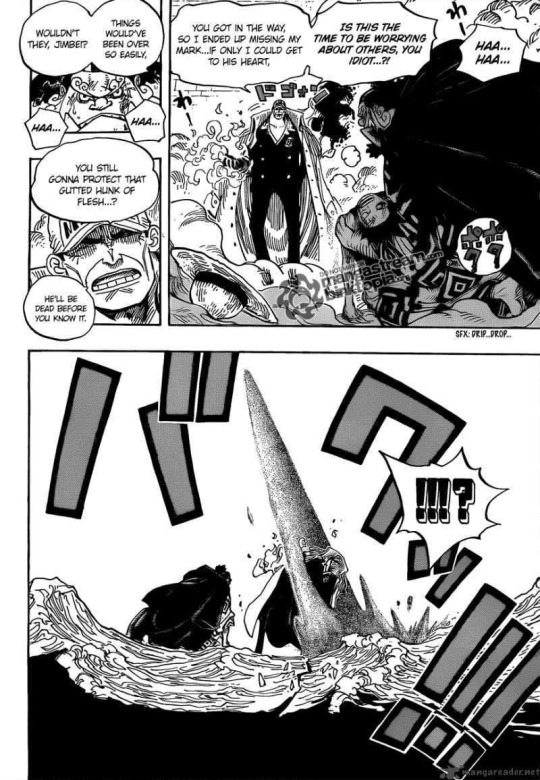
The fact is: Crocodile went above and beyond to save Luffy. That final stand against Akainu is so powerful. Crocodile doesn’t just save Luffy, he rushes to Luffy's aid, slicing through Akainu and reassembles to stand protectively between them. He did not need to do this at all. Oda didn’t need to have him do this either!
There were plenty of other characters that could have essentially done the same exact thing, but Oda chose to have Crocodile, someone who shouldn’t have been on Luffy’s side at all, save his life in the final moment.
Lastly, without a word, Crocodile uses Sables to get Luffy to Law’s ship. He risked his life, faced down the one person who could kill him without a second thought, and sweeps Luffy away to safety without any stated reason at all. In fact, everything he says is deliberately vague. Crocodile doesn’t believe in loyalty, he dumps people if they are weak (see; Alabasta Crocodile vs Luffy desert fight) so his line of “you gotta protect the one you wanna protect! Don’t let them have their way!” Feels so out of character. Crocodile has to have a reason for this odd behavior. And no, it doesn’t end there! In the defense of Luffy, Crocodile has an awesome and powerful moment where he stands in unity with all the Whitebeard commanders. HIS ENEMIES. Crocodile stands in unity with the people, he himself stated he hated more than anything, for Luffy!
These are the moments that alerted people to what would soon be called the Crocomom theory, now called Crocodad. But just because it began there doesn't mean there wasn't foreshadowing from before Marineford.
Let's go over all of that now:
First to talk about is once again Crocodile's crew. Miss Father's Day debuted in episode 124 of the anime and chapter 205 of the manga. She has a green amphibian theme to her, which is interesting because she is a woman with the moniker Father's Day while also having a theme of an animal that is famous for being able to change its gender. Her debut episode even has her introduced along with the reveal that Luffy's using his blood to fight Crocodile.
The next point is something Oda has never explained. Crocodile has strange relationships with children. From hiring a sixteen-year-old Miss Goldenweek, leaving her out of the Mr. 3 assassination order, and her history of actually sinking Crocodile's ships before getting hired, all the way to how Crocodile lectured Luffy in their fight. It just had the cadence of a parent. Not even Luffy's parent, just a parent. He lectures like someone who has experience with children.
Next, Luffy does not look like Dragon. That is a direct quote from Luffy in the manga. But you know who he does look like?

That's right! Luffy looks a lot like Crocodile. If you need more convincing on this, there is a great post by Dashevacotton that puts together many of the best canon pictures of Luffy dressed up like Crocodile. That post is here!
Crocodile and Luffy are incredibly similar. Not just in looks, but in personality, and in their general life.
These two have so much in common. From having a way with animals, to the amount of unadulterated loyalty they've inspired in their crews, all the way to the cadence of their speech.
Crocodile and Luffy even have a similarly goofy reaction to seeing the underground passage to the Alabasta Poneglyph.
Episode 123, episode time 13:16 Crocodile spots the entrance and laughs, "Ha, now I see secret stairs." Also in episode 123, episode time 20:47 Luffy looks around and spots the secret stairs. "That hole... it looks gator-ish."
Even what we know of Crocodile's backstory is that he had a rapid rise to fame just like Luffy by being a rookie who came in and beat down non-canon characters like Douglas Bullet to the shock of the world.
Next, let's bring up an earlier point: Oda-sensei is a mega troll.
This isn't exactly new information, Oda once deflected to bringing up a dick fight instead of answering if Zoro or Sanji was stronger. He is a Troll. He loves wordplay, and he likes to hint hint nudge nudge us all day long. Just look at Oda having Sanji call himself a prince in Alabasta as a joke, only to realize years later that he actually was a prince.
It's because of Oda's tendency to play around and make knowing jokes we've gotten some pretty compelling evidence for the Crocodad theory.
First would be the wordplay!
-Crocodile is closely linked to a Bananawani-> Monkeys like Banana -> Monkey D. Dragon is a reptilian Monkey attracted to Banana reptile. Fight me - A 'crocodile smile' is a term most often used to mean a fake or ingenuine smile. Crocodile's scar has been liked to look like a 'crocodile smile', which would mean Crocodile is the only character that always has a smile on his face. What a fun bit of wordplay to foreshadow the birth parent of Joyboy!
Then there is this SBS alongside the One Piece School spin-off manga by Sohei Koj.
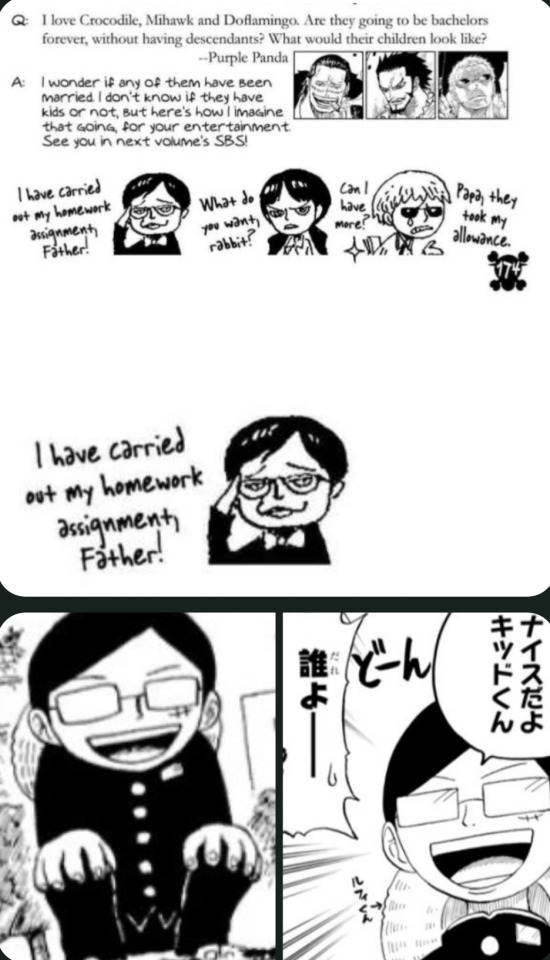
What a great way to get out of revealing Luffy's parentage without actually revealing it!
And of course, we have the One Piece Mafia Theatre episode of the anime.

Oda would certainly make this canon just because of his troll tendencies. This is a hilarious theory because the story supports it yet only a fringe group believes in it. It's hilarious and therefore it's probably true.
Lastly, the symbolism makes this theory truly great.
I've already mentioned how Crocodile's scar being a 'crocodile smile' and thus giving him a permanent smile on his face would make him the most meaningful candidate for Luffy's birth parent. Joyboy, our Sun God Nika, was born from a man with a permanent fake smile; who is also named after an animal with the world's biggest smile.
It's just such a perfect setup, it makes my writer's heart swell.
Since Oda has stated a mother in One Piece would stop the adventure, it would fit that the first major villain in the Grandline to try and stop Luffy's adventure ended up being the man who gave birth to Luffy.
If we are going to speak of symbolism, I'd be remiss not to mention what a crocodile spiritually symbolizes. I really don't think I need to explain why adaptability, creation, ambiguity, and duality mean so much to this theory.

This theory could die or be confirmed any day now that we've entered a God's Valley flashback. I will love it either way but truly, honestly, I believe this. I hope I convinced a few of you to. If you are interested in the succinct list of Crocodad evidence that post is Here!
So in conclusion...
Crocodad is canon!
#one piece fandom#one piece#sir crocodile#anime#dadodile#monkey d luffy#fan theory#until the oda plops luffys mom in front of me i will believe this theory#theories#there is literally no other explanation for marineford without dadodile#luffy literally looks like crocodile#not a crack theory#long reads#long post
1K notes
·
View notes
Text
Welcome to the Guess That Rec tournament!
Do you like enemies-to-lovers? Non-stereotypical queer rep? A cyberpunk setting with dragons in space about friendship, family, and the dangers of capitalism?
Well, this isn't any of those things! This is Guess That Rec, a tournament by the mod of @besttropeveershowdown where we'll be voting on media based entirely on bad, Booktok-style recommendations. Inspired by @guess-that-ship and this post, the rules of the tournament are simple: submit a recommendation for your favorite piece of media, and we'll vote on which ones we like best, BUT, here's the kicker: You may not mention anything about the actual plot of the story. Instead, we will be voting based on promo-post-style recommendations, which can include tropes, representation, setting, genre, very general theme, and anything else, as long as it doesn't describe anything that actually happens in the story!
Season 1 has come to a close, with rec 15 (Red vs. Blue) taking home the gold. Submissions for season 2 will be open on Saturday 5/3!
Example:
Do you want a high school story about a neurodivergent protagonist working through their trauma by going on adventures in the big city? Queer-coded side characters? Male characters breaking through their toxic masculinity and expressing their feelings? Wholesome sibling relationships?
Then you'll love Catcher in the Rye!
The tournament will work similarly to the way @guess-that-ship does. Each rec will be assigned a number for the poll with the rec itself going in the body of the post, and each round, there will be a poll pitting 2 recs against each other. Vote for whichever piece of media sounds most appealing based on the rec alone. At the end of each round, I will reveal the identity of the loser. Guessing what work each rec is for in the comments is encouraged!
THE RULES:
Any type of media is permitted. Both fiction and nonfiction are allowed, but everything must be presented as if it's fiction.
You may NOT mention anything to do with the actual plot or premise of the story. You may, however, mention:
Tropes (ex. enemies-to-lovers, fake dating, unreliable narrator)
Representation (ex. disabled protagonist, gay side character)
Character dynamics and relationships (ex. dysfunctional siblings, grumpy x sunshine lesbians)
Setting (ex. in space, in the Old West)
Genre and subgenre (ex. historical fiction, whodunnit, workplace comedy)
Comparisons to other media (ex. if you liked Avengers you'll love this, it's Twilight meets Hunger Games)
General themes (ex. love, grief, family)
General elements (ex. murders, adventures, road trips)
Anything else that has NOTHING TO DO with what the story is actually about!
3. You may NOT make anything up: everything must be technically true, or at least up for interpretation. So, in my Catcher in the Rye example, I can't say that there are "canonically gay characters" because there aren't, but I CAN say that there are queer-coded characters. Similarly, if there's a character in your piece of media who exhibits autistic traits but has never been confirmed autistic, you can't call them "autistic", but you can call them "autistic-coded" or mention their specific traits. The use of weasel words (ex. describing a mentally ill serial killer stereotype as "neurodivergent", or a gay villain as a "major queer character") is allowed and encouraged.
4. Do not include any identifying details (ex. title, character names, identifying place names) in your rec.
5. Funnier submissions will be given higher priority. Submissions are funnier if A) they're of media that most people have heard of, and B) they are technically true while not at all capturing the vibe of the media.
5a. Additionally, remember that this is meant to be BAD recs: don't just use this as an excuse to recommend your favorite media! If a Booktok-style rec actually provides a good picture of what your media is, consider either rewriting or not submitting it.
6. Should the same media be submitted by two different people with different recs, priority will generally be given to the first submission, unless a later submission was significantly funnier by the guidelines stipulated in rule #5.
7. There is no banned media: go nuts!
Tagging @tournament-announcer!
186 notes
·
View notes
Text

Its been said before, but it bears repeating. If this had been almost any other show, Stede would have been the antagonist/much beloved side character playing second fiddle and/or villain to the more traditionally masculine main character. There has been a long history of queer-coded villains, often feminine men or overtly butch women or any character who is explicitly meant to be read as GNC, whose femininity/gender non-conforming behavior is either meant to disgust or horrify the audience. There are some very very long essays out there about how queer audiences tend to identify with monsters (werewolves, vampires, etc.) and villains in fiction due to how queerness is seen as perversion and deviance from "proper" society and the massive amount of queer-coded villains in popular fiction that we tend to latch onto.
I think what first fascinated me about the writing in OFMD is how Stede has all the hallmarks of a queer-coded villain in an old Disney movie....but without the implied derision/disgust the audience is meant to feel. I'd like to point out there is a very specific stereotype of the "white upper class aristocratic gentleman" who is often vain, engages in flamboyant behavior, and is gently or more overtly coded as gay. This stereotype has many origins in popular culture, one of which is (arguably) how a lot of things associated with the "upper class" of society (decadence, waste, caring about one's appearance, fancy fine fabrics, etc.) also came to be associated with femininity and womanhood specifically. White upper class aristocratic men weren't out doing "man's work" (like farming), they were sipping wine and worrying about their hair. There is also a whole can of worms I could pry open about "homosexuality is an indulgence of the upper classes" being a legitimate political belief held by certain people throughout history.

Stede of course isn't gay-coded, he's literally just gay with a capital bundle of sticks. And the sincerity is why the writing in OFMD works so well. Stede is an actual honest-to-goodness character. He has layers and his flamboyance, his femininity, his gender non-conformity? These aren't treated as anything more serious than character traits, they aren't meant to disgust or horrify the audience. And we know this from the second Blackbeard (the supposed manly masculine big bad tough pirate guy) says he fancies a fine fabric.
117 notes
·
View notes
Note
Am I an insane person or does Malevolent kind of have like. A thing with queer coded villains. Not in a positive or reclamatory way either; it genuinely reminds me of like, old Disney movies and 2000s anime where all the most evil and inhuman male characters would also be written as campy and effeminate. And it seems like Harlan has no idea that he's doing it which is... interesting...
Like. Kayne is the most obvious example ofc. He's flamboyant and flirty and gives John and Arthur pet names. And at first I really liked it but the more it became clear that Kayne was a major antagonist and not just a mysterious neutral actor the more it started to put a bad taste in my mouth. It honestly still could have been okay if Harlan had maybe leaned more into the idea of Kayne and Arthur being parallels/foils but that ended up not really being a thing at all. Atp in the podcast I just get this really strange vibe where Kayne is simultaneously an incredibly violent, deceptive and predatory individual, and he's being written as basically canonically attracted to Arthur and it just. Seems like those two things are kind of connected. Again maybe I'm seeing things that aren't there but it seems like there are some "predatory creepy gay without boundaries" stereotypes being expressed here.
Similar issue with the Butcher. He actually has the closest to any sort of textual queerness of any Malevolent character, since he "falls in love" with his victims. Ummmm I kind of thought we had progressed past the "gay/queer serial killer who has an erotic fixation on the people he murders" trope. Apparently not. Again Harlan almost does something interesting/subversive by making our Perfect Protagonist have a weird connection/companionship with the Butcher, but in the end it seems like everyone agrees that they didn't actually have that much in common, obviously Arthur is unequivocally morally better than him, and then the Butcher gets his head exploded.
It's been longer since I listened to seasons 1-3 but Larson definitely had some similar queer-coding going on with him, as well as some other minor villains (Kellin comes to mind). It just seems like a pattern of Arthur being contrasted with characters who are not just morally corrupt but also written as (subtextually sexually) predatory or creepy, especially towards Arthur. And then Arthur is disgusted by their unnatural desires and heroically defeats or evades them. I could be making something out of nothing but it just feels... icky.
You are absolutely not an insane person of any caliber, this is something fandom has murmured about for a long time! It is definitely a thing in the show that just about any character that encounters Arthur becomes immediately obsessed with him. When it's an ally, like Noel, Oscar, even Daniel and Alia, they are almost immediately convinced of his goodness and go to great lengths not just to help him, but to reassure him that he's A Good Man (tm). But when it's the villains? It's this invasive flirtatious thing, where they're threatening not just to kill him but to lock him up in their basement or something, intimate tortures and such. (Larson maybe less so - he seems more like Southern Gentleman approach but much less handsy than Kayne and Collins). And then there's Antoine, whooo boy. If Antoine really is meant to be gay, and thus was also gay in Arthur's prime timeline when he was a Supervillain? Yeesh I don't want to think of the connotations from CoC1.
I don't believe it's intentionally homophobic, necessarily. I think these villains all represent pretty common horror tropes from over the decades, and Malevolent just co-ops them without thinking that deeply about it. In the same way that the entrance to the Witch's home is a smelly vagina wall: vagina walls have been gross in horror movies and games forever! It's here because it's a thing that all people find gross, right?? I don't think it's any different to him than shoving Arthur full of maggots, or the guy in Deviser having his fingernails torn off. These are default things people are scared of you can plop into almost any horror plot.
But in 2025 it's not wrong to want a writer to actually think about the greater context of the "things everyone thinks is scary" they put into their work, like straight men being threatened with sexual violence, or old women living in filth. Yes horror has been here hundreds of times before. But does it need to be here again? When the sexual violence is the only overt queerness on display and half of all women on the show are old and live in filth?
And of course, the fandom is doing really deranged and kinky shit with these villains, which I 100000000% support. But I don't think he fully grasps the difference between "fans making things legit queer for their own amusement and wish fulfillment" and "the creator playing at making things queer because it's creepy."
Thanks for the ask anon <3 It's very interesting stuff to talk about, especially as a queer person who sometimes writes horror.
74 notes
·
View notes
Text
one thing that pisses me off to no end is all the problems with characters in SJM’s books. For example:
It’s been five books and we still don’t know the LoA’s name (gee, it’s almost as if female side characters aren’t as important as their male counterparts in SJM’s eyes!)
Black female characters are killed off for the white protagonist’s character arc (Nehemia, Sorsha)
Anyone who doesn’t worship the protagonist is automatically a bad guy (Chaol, Nesta, Tarquin)
Characters get ripped on just because they ruin another ship (Gwyn, Lucien)
The only queer rep we have is a gay couple who were a little part in only one book, a bi guy who is a douchebag and threw a girl into the snow naked, and a lesbian who’s a terrible person and character.
Abusive relationships are portrayed as healthy and good, totally ignoring how powerless the women are in those relationships (Feysand, Nessian)
The queer coding on specific characters, only for them to be put in a straight relationship (Manon, Dorian, Elide)
the age gaps (Centuries old male warrior x barely legal teen girl)
It’s been five books and Riceman STILL can’t stop women getting systematically mutilated and oppressed (change takes time my ASS)
The female villains are all sexual predators (ffs, let a girl be evil WITHOUT having it have to do with sex)
Name more if you think of them. I know there’s more, I just can’t remember them.
#sjm critical#anti sjm#tog critical#anti acotar#anti tog#acotar critical#justice for the Illyrian women
58 notes
·
View notes
Text

Fandom Problem #7130:
I heavily dislike the trend of people in fandom headcanoning the, mostly good, popular characters as LGBTQ+, or as allies if not, and the, bad, unpopular ones as homo/transphobic.
I understand that villains have, both past and currently, been queer-coded. I do. And I get that fandom is a queer-dominated space, so people obviously want their favs to be like them, and the characters they hate to be the enemy.
But it's tiring to see the same exact narrative over and over again. There is no change, and no regard for if they actually would be that way or not.
Not all good characters would be accepting, whether through an actual dislike, misinformation, or just ignorance. Not all bad characters would be bigoted, no matter how despicable their other actions may be.
76 notes
·
View notes
Text
The Guilty Pleasure Trope Showdown
Hello, everyone! After my 2-month hiatus, I have returned with our next tournament, which won our last poll for what the next tournament on this blog should be: the Guilty Pleasure Trope Showdown! Have a trope that you absolutely love, even if you're a little bit embarrassed to say so? A trope that you think is objectively bad, but that you get a kick out of every time? Submit it here!
Below is the submission form. Submissions will be open for at least 2 weeks, closing on Sunday 3/30, though I may choose to extend this deadline.
THE RULES:
To be a guilty pleasure, a trope must be something that A) you enjoy, and B) is a little shameful in some way, be it because it's typically considered bad, because it's associated with "trashy" media, because it's considered problematic, etc. Tropes that are universally considered good or a sign of good writing do not belong in this tournament! If it's unclear why your trope is a guilty pleasure, please specify in the propaganda section.
Additionally, all rules from the BTES apply, including:
TVTropes is a site for tropes found in all media, including medium-specific tropes, but for this tournament we're going to ask that you stick to tropes that can be found in any story regardless of the medium it's told in. So no video-game-specific, musical-specific, movie-specific, or any other medium-specific tropes. (For example, the I Want Song is not a valid submission because it is only found in musical media)
Genre-specific tropes, however, are fine and okay.
Tropes can be as obscure as you want, but remember that the more popular a trope is, the more likely it is to get votes.
Regarding sex tropes: While I don't want this tournament getting too NSFW, I also recognize that sex often has a narrative purpose and plays a unique role in the story. Thus, my general rule on that front is going to be: no tropes about specific sexual acts or parts of the sex act, but tropes about sex in general are okay.
Propaganda is highly encouraged and makes the tournament far more interesting for everyone involved (both on the submission form and in the ask box throughout the tournament).
For this tournament, I'm going to soften the rule around offensive and problematic tropes, because I know they can sometimes be guilty pleasures: for example, the gay-coded villain trope might be a guilty pleasure for queer people who like to see queer characters being epic and evil. So, the new rule is: offensive and problematic tropes are allowed in theory, but will be rejected by default unless there is a good enough explanation in the propaganda for why it makes a good guilty pleasure.
Resubmissions from both seasons of the BTES, the WTES, and the MATS are allowed, with the exception of the BTES winners (Found Family and Odd Friendship).
Have fun and happy submitting! Tagging @tournament-announcer.
85 notes
·
View notes
Text
— yukiqueer.
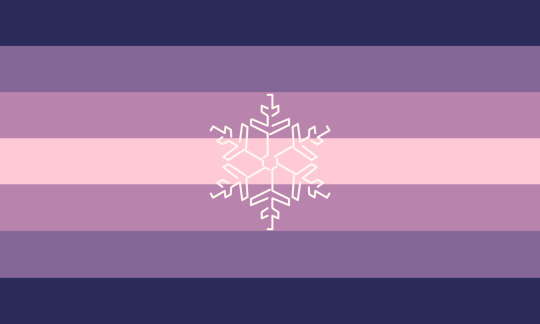
yukiqueer is a blankqueer label that is separate from radqueer, but shares many similar beliefs. yukiqueer focuses on taking complex things by a case-by-case basis, and using intelligence to deduce one’s own support or disdain.
the emoji codes for yukiqueer are 🌨️🌈 / ❄️🌈 / ☃️🌈. it can also be written as snowqueer, ゆきqueer, or 雪queer.
specific beliefs are under the cut.
yukiqueer is in favor of:
— shipping and fiction. all works between fictional characters have a right to exist. an individual who is yukiqueer does not need to identify with the proship label to have this belief. — media literacy & critical thinking. analyze how media treats its taboo topics, and use your intelligence to know whether or not this is trying to change your views. know propaganda when you come across it. — kink, fetish, and other sexual fantasies. as long as all involved parties can and are consenting, any sexual fantasy can be brought to life. — “contradictory” labels. afab transfems, lesboys and gaybians, and all other labels that people say don’t work together should be allowed. — personal definition of labels. only you can define what being bisexual, or pansexual, or anything else is in terms of your own identity. — trans-ID for almost all facets of life. your physical body is just a vessel, and the way you identify is more important than that. — consent for all relationships. you choose what is best for you. — landback for indigenous peoples. indigenous people have a right to ownership of their land, but not to kick all non-natives off of it. — obsessive, grooming, or otherwise abusive relationships with consent from both parties. as long as all involved people have given the okay, what others do in their relationship is up to them and them alone to decide. — selfshipping. this applies to all sharing stances as well — a yumeshipping relationship is as valid as a relationship between non-fictional people, as long as the yumeshipper wants it to be so. — women’s rights. women, both trans and cis, have the right to equality with men. — rights for people of color. racism is backwards and narrow-minded, and has no place in an intelligent society. — full body autonomy. with your own body, you are in full control. abortions, tattoos, hormone therapy, self-harm — all are allowed, and not stigmatized or villainized. — fat and disabled liberation. all people with larger bodies or witn disabilities deserve proper access to the same opportunities and treatment as their thin and/or able-bodied counterparts. — gender non-conformity. no person has to conform to a gender role unless they choose to. a self-identified man, regardless of cis or trans standing, can dress feminine, and the same goes for women and non-binary people.
— otherkin/alterhumanity/IRL/delusional attachment. only we are allowed to choose how we identify, and if the human body you have does not fit you, perhaps another form is better. — romanticization of stigmatized things. you can romanticize or glorify your trauma, or your “bad” habits, or other villainized/taboo things. — proper tags/warnings on all public content. some may not be okay with the same things as you, and it’s important to properly warn people of what your public content contains so those who aren’t okay with it can avoid the upset, and those who are interested can more effectively seek out such content. — informed self-diagnosis. getting a “proper” diagnosis can be extremely difficult, and is out of reach for many. the medical system as it is now is extremely bigoted, and pursuit of diagnosis can be far too expensive even for those with more privilege. as such, intelligent people can recognize and treat a self-diagnosis backed up by information and knowledge as validly as they would an official one. — consanguineous relationships. people who are related can be in a relationship as long as both are consenting and they are informed on the possible risks of having children with one another (with the second rule not applying to couples/polycules unable to have children for whatever reason, or those who are not related by blood but are adopted/transfamily/et cetera). — sex work. sex workers deserve respect and support for what they do, including those who post NSFW content online as their income. inversely, those who pay for sex work should not be shunned either, as long as the relationship between worker and client is not harmful. — medically unrecognized disorders/syndromes. the medical world is not the end-all be-all of neurological knowledge, and if one has found a medically unrecognized term that fits the symptoms they live with, the term is just as valid as any medically recognized one. — all religious beliefs*. *provided these beliefs do not encroach on the rights of others not following said religion. all religions and faiths have a right to exist. an intelligent person can hate a specific religion for any reason, provided their hatred does not manifest publicly and is not used as a shield to treat members of that religion poorly. — sexual education for all ages. all people, regardless of age, should be able to know their body and to know only they have the rights to it. with this in mind, youth should receive sex ed with depth relative to their age — meaning that, for example, high schoolers would receive more in-depth sexual education than middle schoolers.
yukiqueer has a neutral stance on:
— the radqueer label and community. yukiqueer is not inherently supportive of or opposed to those who are radqueer, and in intelligent society it is most sensible to take each individual on a case-by-cade basis. individuals who are yukiqueer may choose to support radqueer, or may be against it. — real person fiction/selfshipping with real people/NSFW fiction of real people. this goes beyond the limits of fictional characters, and as such, is a highly debated one. therefore, individuals who are yukiqueer may choose their own comfort with this concept, as long as they do not try to force their beliefs on others. — anti- and pro-contact stances. individuals who are yukiqueer can choose whether or not they support either of these staunch beliefs in favor of or against contact for the “big 3” paraphilias. — the reclaiming of slurs. yukiqueer individuals can decide if they want to use and reclaim slurs.
yukiqueer has a complex stance on:
— romantic/sexual contact between adults and minors. the relationship is okay if: - it follows romeo and juliet laws (meaning the age gap is 3 or fewer years between parties) - it is a relationship between headmates - both are chronological adults and one is transage OtY - both are chronological minors (following romeo & juliet laws) and one is transage YtO — romantic/sexual contact between humans and animals. the relationship is okay if: - it is a relationship between headmates - both are human and one is transspecies/otherkin/therian — romantic/sexual contact between living beings and corpses. the relationship is okay if: - it is a relationship between headmates - the corpse gave consent prior to death - both are living and one is transdead/transcorpse/anything in that vein.
yukiqueer is opposed to:
— harassment of any kind. if an individual holds beliefs you do not share, an intelligent individual should choose to either ask open-minded, polite questions about the other person’s beliefs, or simply curate their space and remove themselves from contact with the other person. it is never okay to harass someone. — bigotry in any form. racism, queerphobia, sexism, and anything else have no place in an intelligent society. — the creation, distribution, or possession of CSEM/CSAM. no child should be exploited for sexual content. — nazism of any kind, including holocaust denial or inversion. the holocaust was a genocide specifically targeted towards jewish people. while other groups such as queer and romani people were also targeted, one must know that nazis are against jewish people as their main point. a jewish person cannot be a nazi. — misogyny and transmisogyny. women are not inherently lesser than men in any way, and trans women are women. trans women are not a “threat” to cis women. — misandry and transmisandry. men are not inherently lesser than women in any way, and trans men are men. men are not all abusers, and trans men are not “basically women” nor are they “transitioning into privilege.” — transhateful labels, such as transnazi or transbigot. even with no intent to transition, using the transid label in terms of saying you identify with a crueler mindset does not fit with the beliefs of yukiqueer. if you are transbigot or transnazi, you will be treated like a bigot or a nazi and that is not welcome here. — forced recovery. this falls under violation of bodily autonomy — only you can decide if you want to recover from an eating disorder, or an addiction, or anything similar. forcing someone else to recover does not fit the beliefs of yukiqueer. — intersex genital mutilation and forced hrt for intersex individuals. this is a traumatizing violation of bodily autonomy and has no place in intelligent society. no intersex person should be forced to try to appear perisex.
yukiqueer was created for its coiner as it did not agree with all of the beliefs of radqueer, and it wanted to make a label focused on intelligence, open-mindedness, and bodily freedom.
anyone who shares these beliefs can identify with yukiqueer. if you have questions or would like to share your experience with this label or any other blankqueer label, the coiner’s inbox is open.
#proship#pro transid#proshipper safe#profiction#profic please interact#op is a proshipper#proshippers please interact#anti anti#blankqueer#transid#pro transx#transid safe#transx#transid community#transx safe#blankqueer coining#yukiqueer#snowqueer#ゆきqueer#雪queer#🌨️🌈#❄️🌈#☃️🌈
40 notes
·
View notes
Text

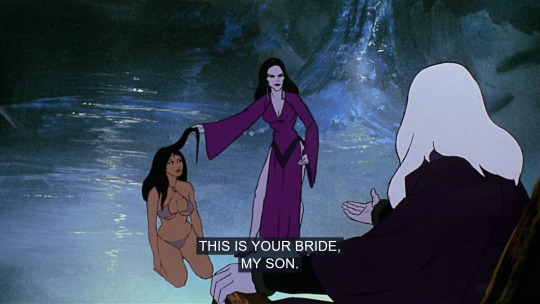
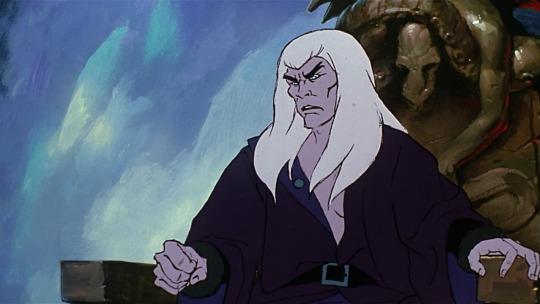
i know queer coded villains are bad but finally seeing a character share my disgust for compulsory heterosexuality was extremely vindicating and also hilarious
#fire and ice#fire and ice 1983#fire and ice (1983)#nekron#queer#film#meme crop#blog#this movie has so much gay shit i NEED to write fanfic for it#(dont mistake that for me saying its good or recommending it lol)
240 notes
·
View notes
Note
And now for a HP fandom question - do you have any thoughts on queercoding in the series and if JKR ever actually intended it, and then backtracked, or if it was always completely unintentional? I'm thinking specifically about Lupin and Tonks (as individuals, not as a ship) Inspired by your post about the intention vs how fans perceived Draco Malfoy. Thanks!
So the first thing I want to do is make a distinction between femme-coding and queer-coding. They're tropes with very similar histories, and a lot of works treat them as the same thing. But Harry Potter doesn’t, and I think we can chalk this one up to JK Rowling’s habit of grabbing aesthetics and visuals without really thinking through the history behind them.
(Like - the goblins. She says she didn’t mean to write an antisemitic thing, and I actually do believe her. But did she use a lot of tropes and images with a long history of being tied to antisemitism? yes.)
So when I say “femme” I mean giving a male character traits stereotypically associated with femininity. Heightened sensitivity/emotionality, an interest in hair, clothes and being attractive, a love of lace/pink/frills, a dislike of violence and physical confrontation, and a preference for the soft power of manipulation, character assassination and poison - versus the hard power of direct confrontation and physical prowess. Are these things super stereotypical? Yes. But they’re ALSO traits you see all the time on male villains, especially ones that you don’t want to seem that threatening. Femme-coded villains show up a lot in children’s media, or as the Big Bad’s #2. They’re not meant to be heroic or sympathetic (since all these feminine traits are not desirable, especially for guys.) But they also aren’t scary, and you can pretty much always play them for comedy.
For example: see almost every male Disney villain. And JKR was writing children’s literature in the 90s, so of course she’s pulling from the same zeitgeist as the Disney Renaissance.
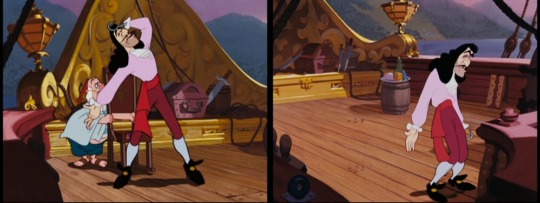
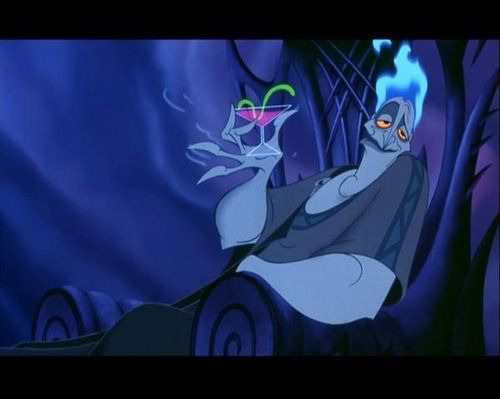
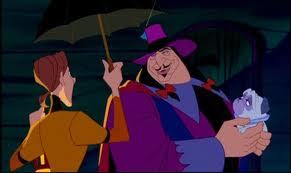
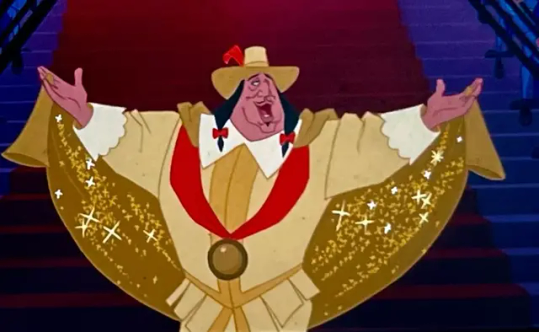

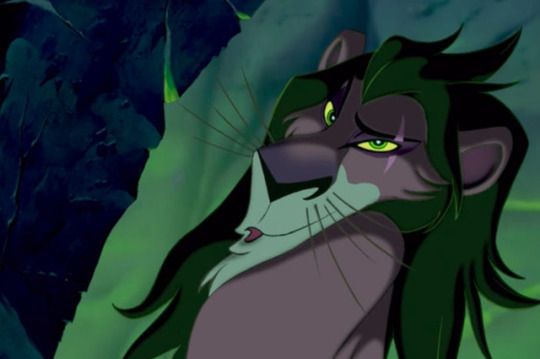
JKR loves herself a femme villain. The absolute gold standard is of course Lockhart - who wears pink, wants to start his own line of hair care products, is self-centered, vain, obsessed with popularity… but he sucks in a fight. His entire MO involves manipulating people into thinking he has these traditional masculine qualities when he just doesn’t. But there’s also fussy, prissy Percy wearing his prefect badge on his pajamas. Bitchy, emotional mean-girl poisoners Draco and Snape (especially early book Snape - which is Snape at his most villainous.) Draco, Percy and Snape are also unusual for being male characters who we see crying for reasons other than grief.
Lucius Malfoy is an interesting case because he starts off quite masc. He’s threatening to curse people, the governors are scared of him, etc. But, as the books go on… and he gets less powerful… he also gets more femme. When we meet him in Book 5 he’s no longer threatening people, but bribing them, spreading rumors, and giving interviews to the Prophet casting Arthur Weasley in a negative light. He's also getting really into peacocks. In Book 2 he was a major threat, but as he gets recast as Voldemort’s #2 he becomes a more femme, soft-power villain. When he leads the attack on the Department of Mysteries, he absolutely bungles it, which defines his character (and relationship with Voldemort) for the rest of the series. And it makes sense that Lucius is given this kind of treatment! It’s a way of communicating that there's a new villain in town, a real villain.
So, are any of these femme-coded villains additionally queer-coded? I’m actually going to say no. Queer-coding is (like it says on the tin) finding ways to imply that your character is specifically gay. Like maybe giving them a same-sex relationship that is written romantically, but not explicitly called out by the text. Or pairing up all of the characters except them. Maybe have other characters joke about them being gay, and use that as a way to talk about the subject with some plausible deniability. Or they could just play suggestively with a cigar, or a walking stick. There are different strategies.
But Lockhart doesn't get any of that. Honestly, I think that if JKR actually thought of him as gay, she would have been a lot more wary about a scene where he keeps Harry alone with him in his office for way longer than he’s supposed to. And she might have skipped this joke:
“Harry was hauled to the front of the class during their very next Defense Against the Dark Arts lesson, this time acting a werewolf (...) “Nice loud howl, Harry — exactly — and then, if you’ll believe it, I pounced — like this — slammed him to the floor — thus — with one hand, I managed to hold him down — with my other, I put my wand to his throat (...) he let out a piteous moan — go on, Harry — higher than that — good —”
Like. At least she would have picked a different word than “moan,” right? Which unfortunately has slightly sexual connotations. Especially if she wanted to keep Lockhart a buffoon, to properly set up the twist at the end.
Slughorn also gets femme-coded in a similar way: he loves his candy, his parties, his smoking jackets, his lilac silk pajamas, his web of connections he can use to get stuff (Lucius style.) We are introduced to him squatting in specifically a “fussy old lady’s” house. He’s also unusually emotional, getting weepy at Aragog‘s funeral. But I don’t think we’re meant to read him as actually gay, or else his relationship with Tom Riddle might’ve read a little too close to Tom seducing/trying to seduce him. Which is a beat JKR does subtly play out with Hepzibah Smith, but idk. by that point at least Tom is a legal adult.
(As a side note - the Harry Potter series got so lucky that all of its adult characters are played by absolutely top-shelf actors who are aware of the connotations and history behind various symbols, and do consider these things in their performances. Kenneth Brannagh and Jim Broadbent are good enough to make sure there’s not even a hint of iffy subtext when they play Lockhart and Slughorn.)
Draco, Snape, and Percy all have a case of the not-gays. Percy has a girlfriend (we don’t really see her or anything, but we’re told she’s there.) Snape of course gets his whole thing with Lily, and Draco… after one too many beats where it’s clear that Pansy is into him, but he’s not into Pansy… gets a scene where he’s talking to his buddies with his head in her lap. (JKR uses “no one‘s good enough for me” beats with Blaise, Draco and Sirius, and the idea there seems to be more that they have undeservedly high opinions of themselves, and less that they don’t like girls.)
But, I do agree that a lot of JKR's characters do come across as a little more queer than intended. It boils down, I think, to the general lack of any kind of romance in the Harry Potter books and JKR being generally bad at/uncomfortable with writing male attraction directed at women, BUT being perfectly happy writing attraction directed at pretty guys. And because of that… yeah, it can sometimes feel like maybe Harry has a thing for Cedric. Especially when Dudley goes on to tease him about Cedric being his boyfriend, which I believe is the only actual mention of gay people in the entire series.
So is there any intentional queer-coding in the book? It’s really subtle, but yes. I think Dumbledore is queer-coded. He is unusually emotional/cries unusually often for a Rowling guy. He is also given a scene which emphasizes his “flamboyantly” cut plum-velvet suit, and his relationship with Grindelwald is implied to be romantic for one book and two movies before being actually confirmed in Fantastic Beasts 3. (With the line of dialogue “I was in love with you.” Big step up from “We were closer than brothers.” which is an odd thing to say about someone you are interested in romantically.)
But you brought up Tonks and Lupin, two characters very commonly interpreted as queer. So let’s get into that. JKR has said that she considers Lupin’s lycanthropy to be a metaphor for stigmatized diseases like AIDS. And… as incredible as it is to say… I actually do not think that she made the jump from there to thinking that maybe the character suffering from AIDS should be gay.
Because the narrative places so much weight on Lupin being bitten young and then on maybe not being allowed to attend school, I’m pretty sure that he’s not intended to be queer so much as he’s meant to be Ryan White, the literal poster child for AIDS activism who got infected via blood transfusion when he was two. Tragic, absolutely. But not gay. Honestly, I hope JKR was thinking of ‘lycanthropy’ as a metaphor for stigmatized illness in the abstract and not as a comment on gay people specifically. Because otherwise, Greyback’s thing about biting children becomes a mash-up of two of the biggest homophobic boogeymen from the 80s: gay men infecting people with AIDS on purpose because… idk, they hate the world or something. And the influence of gay men somehow “turning” children gay. Both absolutely real, if ridiculous, moral panics.
On top of that, Remus and Sirius do get a pretty clear case of the not-gays early on (“He embraced Black like a brother.”) Buuuut Alfonso Cuarón did think through those implications for Movie 3, absolutely saw Lupin as gay, and directed David Thewlis to play him accordingly. No reports confirming or denying whether Alfonso Cuarón ships Wolfstar, but I think that if I’m an actor trying to make sense of Lupin’s motivations… and I know he didn’t show Dumbledore the Marauders’ Map and didn’t tell anyone Sirius was an animagus… and then I’m told my character is gay… well. Anyway, I think there are absolutely hints of Wolfstar in that performance.
And there's Tonks. Tonks is introduced during a very spooky segment in Book 5: Harry has been going through it, been left alone at the Dursleys while having what sounds like a depressive episode. It’s dark, he hears intruders. It's a really good piece of writing. But JKR knows that it’s the good guys who are coming and thinks, okay. Let’s make that as clear as possible from the word go. And so the first thing Harry sees is Tonks' pink hair. And what kind of person has pink hair? A young adult. A punky young adult. And what power would a teenager think was cool? Well, the ability to change the color of their hair at will. That, by itself, would have worked perfectly fine for this character.
But then (for reasons best known to herself) JKR goes further. Even though Tonk’s hair changing color is easily 90% of the transformations we see and there is no plot reason her appearance needs to change more than that, we see her drastically change her age and body type. When you think about this power for more than five seconds, it becomes kind of OP. For worldbuilding reasons alone, my instinct would’ve been to tone it down a bit.
But no, we have this counterculture character who seems interested in her career and not in a relationship, who can easily change anything about her body, and (if her ability works anything like Polyjuice) that means she should definitely be able to change her gender. Cool.
Then, in everyone’s least favorite romance, Tonks and Lupin are paired up. I have heard the argument that this was meant to walk back queer-coding, or to punish people who thought they were queer... but I don’t think that’s the case. I don’t think JKR expected these two to be fan favorites, and then was kind of surprised when everyone wanted to hear about their continuing adventures.
(There are a handful of characters who JKR clearly really enjoys - and really enjoys writing - that fandom honestly could not care less about. Mundungus Fletcher and Ludo Bagman spring to mind. But the reverse is also true. She had one story for Lupin and people wanted to see more. Tonks is probably supposed to be her comment on immature young adults: she is loud, in your face, causes mild destruction and is “a little annoying at times.” But the fans fell in love with her.)
So JKR has these two fan favorite characters and nothing for them to do. A romance is something for them to do. JKR also has a kind of weird pattern where good people need to either have kids or take care of kids. It’s not good to be a woman who isn’t involved with taking care of children in some fashion: see Rita Skeeter, Dolores Umbridge, Bellatrix Lestrange. This is also (I think) why Harry names his kids specifically after Severus, Sirius, and Albus. Since they’re good men, JKR had to find a way to give them kids after the fact.
So yeah. I think we were meant to read Tonks and Lupin having a kid as kind of a reward, or at least as proof of their intrinsic goodness. There also just isn’t another guy in the right age range to ship Tonks with. The only other option is Sirius.
(Harry in the books and Lupin on Pottermore both suspect that Tonks/Sirius is a thing. Completely forgetting, I guess, that they're cousins.)
#hp#hp meta#hp close reading#queer coding in hp#femme coding in hp#jkr critical#anti jkr#draco malfoy#severus snape#lucius malfoy#percy weasley#gilderoy lockhart#horace slughorn#remus lupin#nymphadora tonks#albus dumbledore#aids#literary analysis
207 notes
·
View notes
Note
I'm having doubt because of the overall rejection towards byler, ppl that I know irl ship them or at least consider the possibility (without me saying anything) but ppl on the internet don't seem to? I'm surprised that queer people ship mileven, and they are totally allowed to ofc, but it surprises me a bit, is byler really that bad and forced or are ppl just haters?
My dear anon, the reason so many people don't think byler is gonna happen has nothing to do with the likelihood of byler, and everything to do with homophobia and heteronormativity.
This is actually a really great question for Pride Month, so here's some queer media history for you.
Queercoding and Heteronormativity
Let me introduce you to the Hays Code:
The Motion Picture Production Code was a set of industry guidelines for the self-censorship of content that was applied to most motion pictures released by major studios in the United States from 1934 to 1968. It is also popularly known as the Hays Code, after Will H. Hays, president of the Motion Picture Producers and Distributors of America (MPPDA) from 1922 to 1945.
Wikipedia
The code was made to regulate the moral content of films. It regulated films to showing only "correct standards of life" and not showing audiences that could tempt them to sympathize with "crime, wrongdoing, evil, or sin". The "crime, wrongdoing, evil, or sin" in question including abortion, ridiculing religion (read: christianity), nudity, premarital sex, a love triangle including married characters, interracial marriage, prostitution, and of course homosexuality.
While the code was technically voluntary, it was mandatory for any filmmaker who wanted their film to show in American theaters. For 30 years, almost every film produced in the US adhered to the Hays Code.
During this period of time we see the invention of queer coding. It was a way to acknowledge a characters LGBT identity, while still adhering to the code.
Some coding meant borrowing from some of the coding for straight sex (which was obviously also censored) like lighting each other cigarettes. Other hints a character could be queer could be that character wearing lavender colored clothing, handkerchiefs, or scented handkerchiefs. Calling a man a "confirmed bachelor" for example, was queer coding.
Anything more explicit then that had to give the character's "moral conflict" "the proper frame of reference". Meaning, If a character is more obviously gay they are punished for it. They're villains, and/or they die. They most certainly don't get to have a happy ending. This is where you get the bury your gays trope.
The code dissolved in 1968, instead becoming a rating system to warn audiences about a film's contents rather than outright blocking them. However, queer coding stayed.
There's a theory that I couldn't find a source for, but one that I remember from my Pop Culture class where I first learned about this stuff. It's called Inoculation Theory. The idea is that if you slowly introduce a top into pop culture and film, such as queer narratives, the general public will build a tolerance to it - like a vaccine. So queer coding slowly started to turn into queer storylines and queer storylines.
(A really great documentary to watch on this subject is called The Celluloid Closet, which discusses LGBT people in cinema and how that have evolved up until 1995 when the documentary was created.)
However, as a side effect of inoculating the public to queer narratives, they have grown tolerant of queer narratives in a different way... They have seen queer coding so much, they have grown less sensitive to it. They fail to see the signs of a queer narrative because it doesn't matter - that character will probably be killed off. They won't get a happy ending, and they certainly won't get to be in a relationship with another member of the cast.
Now... it's not that overt. I doubt a lot of people are thinking those exact things, but it's so ingrained in our collective society - people don't see queer storylines as ones that tend to get fully realized, or get happy endings, based on the media they've consumed.
Now this is all assuming the best of people, but there's a nefarious flip side to all of this:
Queerbaiting and Homophobia
Where queer coding is a way to get a queer narrative into the world without pissing off the censors, queer baiting is the opposite. Queer baiting involves the marketing of the show or movie alluding to LGBT representation without actually giving that representation - at least not in a meaningful way. They're trying to bring in a broader audience to watch their show or their movie without alienating their straight, homophobic, conservative audience members.
Famous examples of this include Sherlock, Supernatural, and Voltron.
Queer baiting is homophobic and cruel and common.
So with queer coding and queer baiting combined, the general audience doesn't see queer storylines as viable. Queer characters are expendable, and their stories aren't as important as they stories of straight characters.
Now, there is queer representation out their in the world, but it's less likely to happen, in the eyes of the conservative, heteronormative public, in a normal show or movie. A visual media that isn't explicitly "for the gays", like Heartstopper, Love, Simon, or Red, White, & Royal Blue. (Those shows and movies are great - but they're explicitly queer stories.)
The idea that a ship like Byler could show up in a wildly popular non-queer (to them) show, is frankly unheard of.
But more than just general skepticism and denial - we are in a period of conservatism and homophobia. People are just homophobic, and the idea that a gay character could "tear apart" a straight relationship... they're afraid of it.
And even more so because it's plausible.
You wanna know why people don't worry about Robin/Vickie - because it's not breaking up an established straight couple. Ronance? Steddie? Because it's not gonna happen. Let the gays have their "silly little romances" because they don't stand a chance of becoming canon. It's just fanfiction and headcanons.
But Byler is real, and it's threatening. That's why they hate it.
Hays Code sources: 1/2/3
28 notes
·
View notes